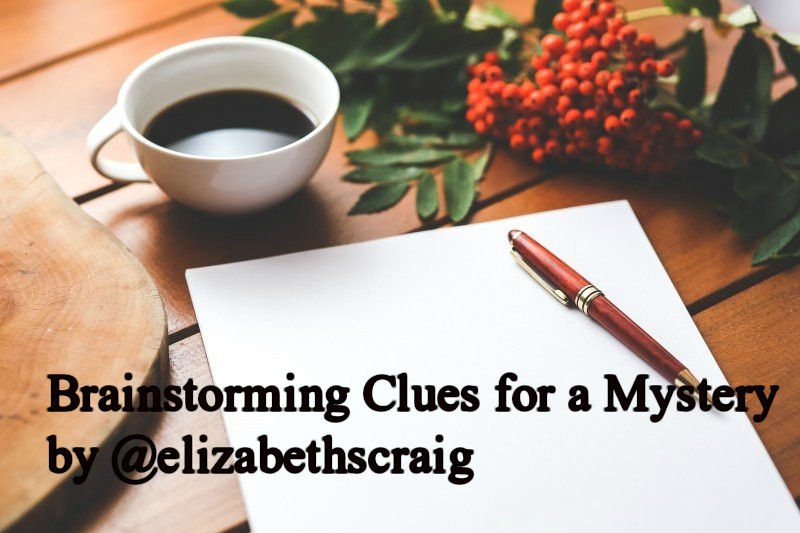by Elizabeth S. Craig, @elizabethscraig
For me, brainstorming clues for my mysteries has always been one of the toughest parts of writing a mystery. Mystery readers are incredibly savvy and they’re very good at picking out clues and drawing conclusions. To keep them from solving the mystery too early, the clues need to be pretty good…and you’ll need to distract from them, too.
But how do you brainstorm these clues?
One trick that I use is to start at the end and write a confession by the killer. The killer explains how he did it and why he thought he was getting away with it. When the killer is confessing, you also have your sleuth explaining how she figured out he was the perp. This scene doesn’t even have to go into your book, but it sure can help to figure out what clues the killer left behind.
Some good questions for your killer to answer: how did he/she do it? What made them worried later? Did they leave anything behind? Who did they try to implicate? What do they know about the crime that no one else knows? Did they absently mess up their own alibi at some point in the investigation?
I don’t always work backwards in this way, but it can really help when I’m outlining a book.
As I mentioned earlier, the next step is to deflect attention from your clues by introducing a red herring that seems much more important. You could also use some other form of distraction: an argument between two suspects, for instance. Or even the discovery of another body. :)
If you’re a writer, how do you come up with clues for your mystery? As a reader, are you good at picking up on them (I love it when I’m surprised at the murderer when reading!)?
Tips for Brainstorming Clues for a Mystery: Click To TweetPhoto on VisualHunt

Hi Elizabeth – this post drew me in … I’d love to do that – perhaps I should write something sometime!! I quite often read articles ‘backwards’ … but not books. Love the way you’ve explained it here – cheers Hilary
Thanks, Hilary! Hope you’ll give it a go sometime. :) It’s a fun exercise!
This works great when you know, as the author, who the killer is. It’s how I typically work. I don’t always begin with the end in mind, however. I have to work out who the killer is, as I go along. And, sometimes, characters have a way of changing the story and the planned ending.
And I frequently change the killer, ha. But this plan still works because then I have some amazing red herrings that lead readers in the wrong direction. :) You’re right about characters messing with the ending!
That’s a clever idea. What I’m working on now has a lot of revelations and that trick would’ve really helped when I was outlining.
It’s an easy exercise that can lead a story in some cool directions. Maybe you can try it next time. Sounds like your book is really coming along!
Oh, I love the idea of planning the confession (whether you include in the book or not). What a helpful way to keep the story’s clues and facts straight! And it’s a good tool to use as you go back over a draft to look for inconsistencies. I really like that!
Good point about the inconsistencies! Yes, it can really help with those, too.
The best kind of mysteries to me as a reader are the ones where I’m sure I know who the killer is only to be surprised at the end that it was my least likely suspect for reasons I hadn’t considered. Like your way of planning.
Those are the best! I *love* being surprised (and it doesn’t happen often enough for me!)
Great post, Elizabeth – thanks! I’ve never pre-written a killer’s confession, though I love the idea. I have written summaries of events from the bad guy’s POV, which is helpful. I try to keep in mind while writing that every villain is a hero in his own mind, that he feels his choices, no matter how awful, are justified and serve a greater good.
In terms of setting up clues, I really like the idea of writing the protag/sleuth’s account of how she figured it out in advance.
P.S. – I’m not getting email notifications of new blog posts for some reason. I haven’t unsubscribed or anything. ??
That’s so true about the villain and I frequently forget to look at it that way! Good reminder.
And…ugh!! Oh no, I hate to hear that. The email plugin that I’m using has had some glitches lately, but I’d hoped it was back on track. And the plugin is bombing as I’m trying to search it :( . Maybe unsubscribe and resubscribe? Sorry about this!
Writing a confession is a really smart way to do it.
It helps a lot to quickly figure out a direction to move in, for sure!
Love the idea of actually writing an ending scene where the perp/sleuth both reveal what went down…and then not necessarily include it! Sounds helpful for making it clear in my own mind.
My WIP is written with alternating chapters first person/third person POV. This gives me the opportunity to write the crime in and have the readers know who did it before the protagonist does. They are watching her solve the crime, coming closer and closer to the bad guy…middle-grade readers cheering for someone their own age!
Oooh, your story sounds fun to write! And fun to read, too–I think a MG reader would love the smug feeling of knowing whodunit before the sleuth! Nice idea!